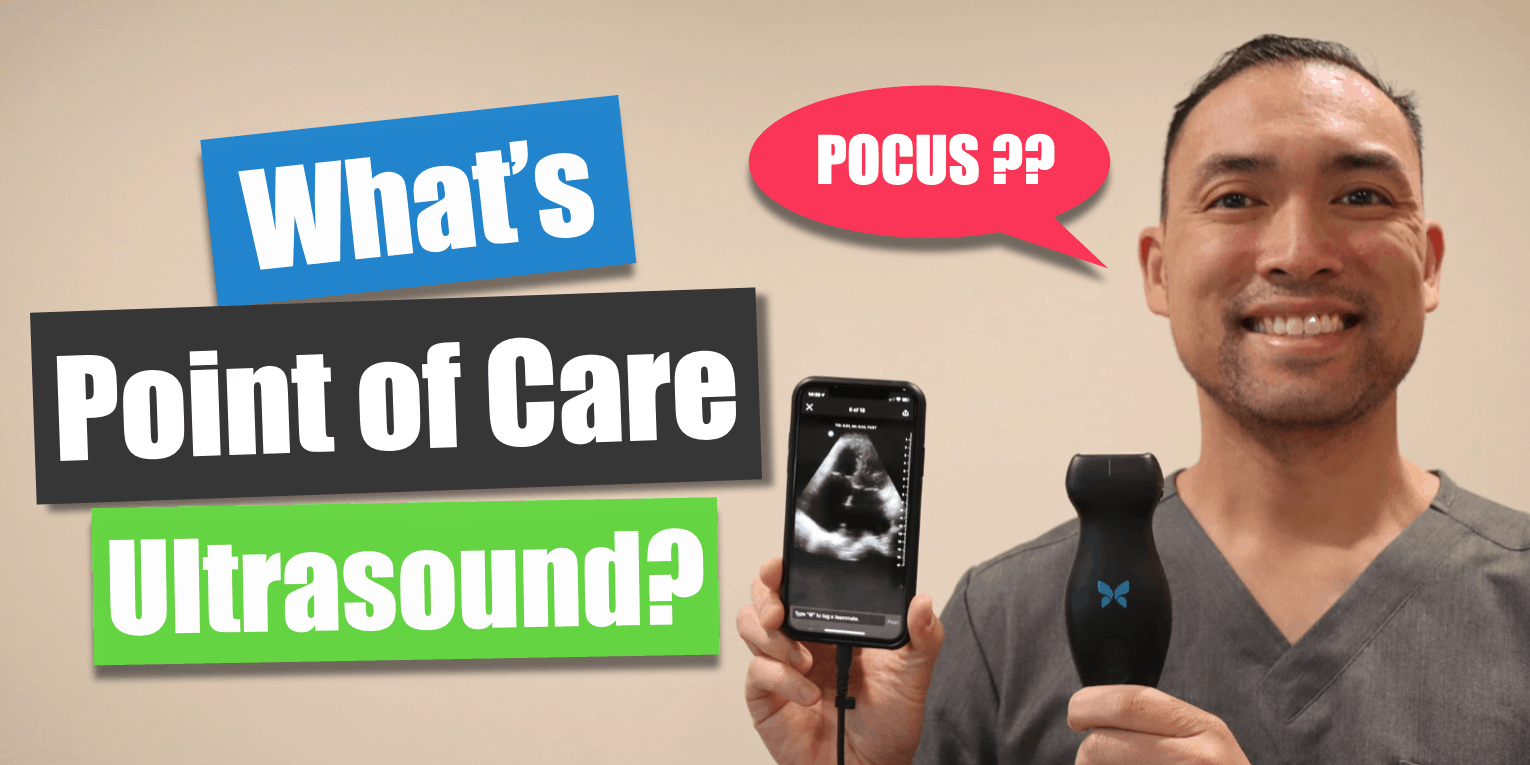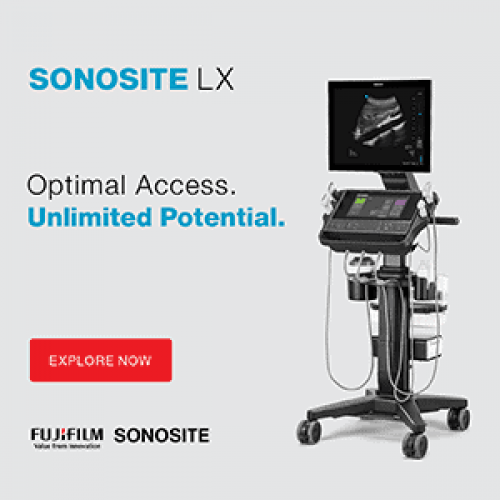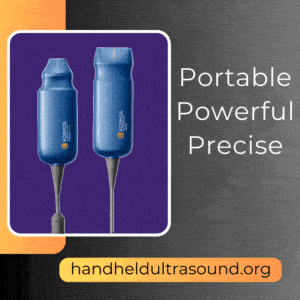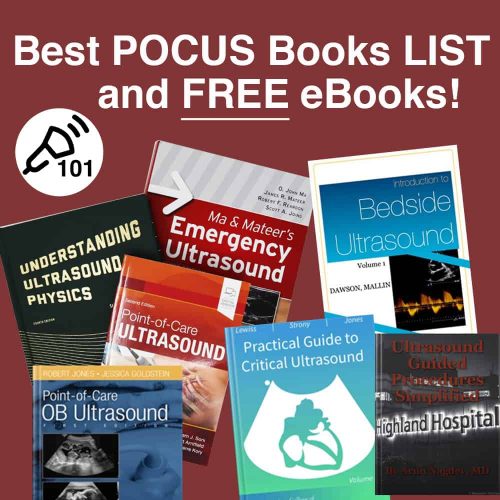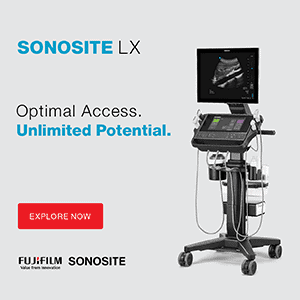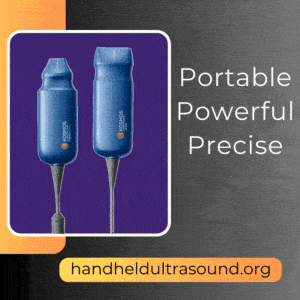As ultrasound devices become more portable and cost-effective, the breadth of specialties and fields using it for Point of Care Ultrasound (POCUS) has expanded greatly. Previously, ultrasound devices would weigh over 400 pounds and now they weigh less than one pound and can be connected to your phone! Given the cost-efficiency and improved access, these newer ultrasound devices have changed the way we practice medicine and treat patients at the bedside.
So what exactly is Point of Care Ultrasound (POCUS)? Point of Care Ultrasound (POCUS) is a bedside ultrasound exam performed by a treating healthcare professional who interprets the ultrasound images immediately at the patient’s bedside to manage their care.
In this post, I want to go over what makes Point of Care Ultrasound (POCUS) so important, who can perform POCUS, what applications can POCUS be used for, and how to get training in POCUS.
Table of Contents
How is Point of Care Ultrasound Different from Ultrasounds by Radiology?
I often get asked what is the difference between Point of Care Ultrasounds and ultrasounds performed by the radiology department. Here is a list of some of the key differences:
Who Performs Point of Care Ultrasound?
Although Point of Care Ultrasound is typically thought of as being performed by physicians, we have seen a dramatic increase in its use by multiple providers. Point of Care Ultrasound (POCUS) can be performed by any qualifying healthcare professionals such as nurses, advanced care providers, medical students, resident physicians, and attending physicians.
For Point of Care Ultrasounds, the healthcare providers treating the patient are performing, interpreting, and using this data to directly treat their patients. This can be the treating clinician or the bedside nurse treating the patient. This is opposed to formal radiology ultrasounds where an order is placed and an ultrasound technician (not directly involved with the patient’s management) comes to perform the ultrasound and acquire the images. Those images are then sent by the technician to a radiologist to read the study and send a report back to the treating clinician.
Table of Professions, Specialties, and Subspecialties that use Point of Care Ultrasound (POCUS)
| Professions | Specialties | Subspecialties |
|---|---|---|
| Medical Assistants | Anesthesiology | Cardiology |
| Medical Students | Dermatology | Critical Care |
| Nurse Practitioners | Emergency Medicine | Emergency Medical Services |
| Nurses | Family Medicine | Endocrinology |
| Paramedics | Internal Medicine | Nephrology |
| Physician Assistants | Neurology | Pain medicine |
| Physicians | Ob/Gyn | Pediatric Anesthesiology |
| Ophthalmology | Pediatric Emergency Medicine | |
| Orthopedics | Pediatric Surgery | |
| Otolaryngology | Pulmonary & Critical Care Medicine | |
| Pediatrics | Rheumatology | |
| Plastic Surgery | Sports Medicine | |
| PM & R | Urology | |
| Surgery, General |
Who Interprets Point of Care Ultrasounds?
Point of Care Ultrasound exams are performed AND interpreted by the treating clinician. This is different from the radiology model that requires an ultrasound technician to perform the study, send the image to the radiologist, and the radiologist then interprets the study and send a read back to the treating clinician. It is not uncommon to take over 8-12 hours for a radiology ultrasound read after it has been ordered by the clinician.
Who Bills for Point of Care Ultrasounds?
Point of Care Ultrasounds can be billed directly by the treating clinician. Ultrasound billing does require a process of archiving, quality assurance, and knowledge of CPT codes/reimbursements. For a comprehensive list of ultrasound CPT billing codes and approximate reimbursement rates click HERE.
Point of Care Ultrasounds are Performed Immediately
Point of Care Ultrasounds are performed immediately at the bedside of the patient and does not require a technician to come in from the radiology department or even from home sometimes. This is extremely beneficial to the patient as it can decrease their length of stay in the acute care setting. In addition, if patients are unstable and in shock, sometimes they cannot afford the time needed for an ultrasound technician to come in.
What Types of Point of Care Ultrasound Applications Are There?
The amazing thing about ultrasound is that there is no radiation and therefore lending itself to many useful bedside applications. Almost any organ system can be examined using Point of Care Ultrasound to help the clinician diagnose and manage their patients. That is why we are seeing Point of Care Ultrasound being used from all types of specialties above. Here is a list of some organ systems with links to POCUS content to get you started:
List of Point of Care Ultrasound Applications:
*Click on links to learn more
| POCUS Applications | Website Link |
|---|---|
| Knobology/Physics | https://www.pocus101.com/knobology-and-physics/ |
| Abdominal | https://www.pocus101.com/abdominal-ultrasound/ |
| Aorta | https://www.pocus101.com/aorta/ |
| Cardiac | https://www.pocus101.com/cardiac-ultrasound/ |
| DVT | https://www.pocus101.com/dvt-ultrasound/ |
| Msk/Soft Tissue | https://www.pocus101.com/musculoskeletal-and-soft-tissue-ultrasound/ |
| Ocular | https://www.pocus101.com/ocular-ultrasound/ |
| Obstetrics-Gynecology | https://www.pocus101.com/obstetrics-and-gynecology-ultrasound/ |
| Pulmonary | https://www.pocus101.com/pulmonary-thoracic-ultrasound/ |
| Trauma | https://www.pocus101.com/efast-scan-extended-focused-assessment-with-sonography-for-trauma/ |
| Ultrasound Guided Peripheral IV's | https://www.pocus101.com/ultrasound-guided-peripheral-iv/ |
| Ultrasound Guided Central Lines | https://www.pocus101.com/ultrasound-guided-central-line-placement/ |
Why Should You Learn Point of Care Ultrasound?
I believe Point of Care Ultrasound is the future of medicine. It significantly helps confirm or refute diagnoses based on our physical exam in the absolute fastest way possible at the bedside. I have seen a tremendous benefit to our patients. The reason the field of Point of Care Ultrasound (POCUS) has grown so rapidly is that healthcare providers are continually realizing the benefits that it has on patient care. Given the benefits of Point of Care Ultrasound (POCUS) toward patients in terms of decreased cost, decreased length of stay, and improved overall patient care, it is no wonder why so many different fields from physicians, nurses, advanced care providers, and even pre-hospital are embracing it.
| Benefits of Point of Care Ultrasound |
| POCUS Decreases Patient Wait Times |
| POCUS Can be Performed on Unstable Patients |
| POCUS Improves Your Understanding of Anatomy |
| POCUS Allows for Safe Procedures |
How to Get Point of Care Ultrasound Training?
I have found it fairly difficult sometimes to give good resources to trainees looking for Point of Care Ultrasound training. There are online courses, live courses, YouTube videos, and many websites. The resources on POCUS 101 are meant to help any user find the most pertinent information regarding learning the exact content they need to start using Point of Care Ultrasound in their practice right away. We love your feedback and are trying to give people the best user experience for Point of Care Ultrasound training as much as possible.
Point of Care Ultrasound Books and Free eBooks
If you want to get started on learning more about POCUS, we made this extensive list of Point of Care Ultrasound Books as well as free Ultrasound Resources (eBooks and PDFs).
Is There Certification for Point of Care Ultrasound?
The short answer is it depends on what profession and specialty you are in. There are multiple societies that have Point of Care Ultrasound Certification.
Personally I received certification from the American Registered Diagnostic Medical Society (ARDMS) and the National Board of Echocardiography.
The first question you should ask, however, is if you even need to get certified in Point of Care Ultrasound? Most places do not limit the practice of Point of Care Ultrasound because providers do not have certification. However, each hospital does have its own unique privileging process for procedures such as Point of Care Ultrasound.
Certification costs thousands of dollars to obtain and maintain. I do not want to shy you away from certification, and found them useful for my own practice. However, I do want you to make the best use of your time and money.
Certification makes sense if you want to take that extra step to learn more about Point of Care Ultrasound, become known as an “expert” in Point of Care Ultrasound at your hospital, or are leading the expansion of Point of Care Ultrasound at your institution.
Here is a table to help you with links to specific societies based on different specialties.
| Certification Society | Website Link |
|---|---|
| National Board of Echocardiography | https://www.echoboards.org |
| American College of CHEST Physicians | https://www.chestnet.org/Education/Advanced-Clinical-Training/Certificate-of-Completion-Program/Critical-Care-Ultrasonography |
| Alliance for Physician Certification & Advancement | https://www.apca.org |
| American Registry for Diagnostic Medical Sonography | http://www.ardms.org |
